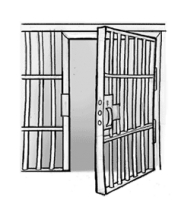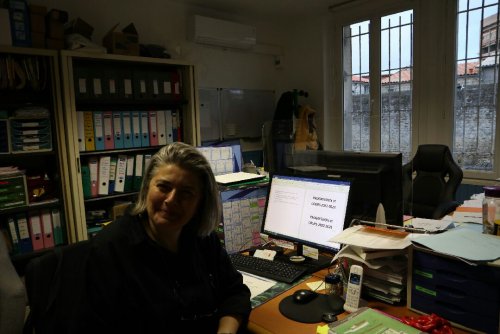
Teacher in the Rochefort prison publié le 21/01/2023
Mrs Valérie Moreau tells us about her experience as a teacher in an unsual teaching structure.
Teacher in the Rochefort prison
I have been teaching in the prison of Rochefort since September 1, 2013.
As an English and French professional high school teacher since 1997, I have taught in various technical colleges : J.F Cail, Chef-Boutonne ; EREA, Saintes ; P. Doriole, La Rochelle ; M. Dassault, Rochefort.
I started teaching English in the prison of Rochefort . Then, I applied for the job of RLE (Responsable Locale de l’Enseignement/ Local Educational Mandator).
My missions
My work mainly consists in 3 tasks :
- Teaching : French, Literacy, French as a Foreign language, English, History, geography, plastic arts and conducting a discussion and reading workshop.
- Handling all the administrative parts of the ULE (welcoming the prisoners, shaping groups, organising lessons with potential outer teachers (mathematics, philosophy…), following up the weekly students’ attendance, organising exams, managing the ULE budget, sending the annual reports and accounts, attending the various meetings organised by the prison administration.
In my school schedule, three hours a week are devoted to these tasks. - Implementing projects.
Indeed, if I want to get involved either in regional or national projects -contests, fresco painting, educational outings, authors meetings …-
Work-related difficulties
I must admit that, this kind of learners, that is to say prisoners, are sometimes difficult to deal with (there are only adult men in Rochefort. One third of our students suffer from mental disorders).
Moreover, in a detention house, the turnover rate is high and doesn’t enable a conventional learning progression. Therefore, you have to consider each lesson like an educational sequence.
Futhermore, exams are difficult to organise for you never know how long the students will stay : at any time, they may be either freed, sentenced then sent to other prisons, or brought to the Court of Justice. You also must take into account the situation of each person : the changes in their penal situation, the « bad news », their possible changes of attitude after a visit let alone the relationships between inmates.
Last but not least, you may happen to feel isolated from your colleagues and supervisors, whose offices are in Bordeaux. You may also feel frustrated not to teach your main subject, namely English, as far as I am concerned.
Positive aspects of the job
One of the aspects of the job that I appreciate most is the high teaching freedom level.
I enjoy teaching to adults who -and that makes all the difference- are willing to attend classes and are therefore motivated.
What pleases me the most in the job is the variety of subjects taught, the constant renewal I have to face and the fact of acquiring more skills (art lessons, history, French as a Foreign Language). In that sense, working in a detention center- especially in a small prison such as Rochefort- has more to see with the job of a primary school teacher.
I also like the autonomy we are given to do that job and inherently, the trust placed in us.
I appreciate working with numerous partners : SPIP (the Integration and Probation Correctional Service), vocational training, the medical unit,the Red Cross, prison visitors, local libraries, universities, volunteers, members of the clergy…
So as to conclude, exchanging and working with the different members of the staff and partners in the prison of Rochefort is highly enriching. These experiences enable to acquire a vision of a side of our society which is only accessible to few people. Most of all, that job allows me to feel useful.
Valérie Moreau


